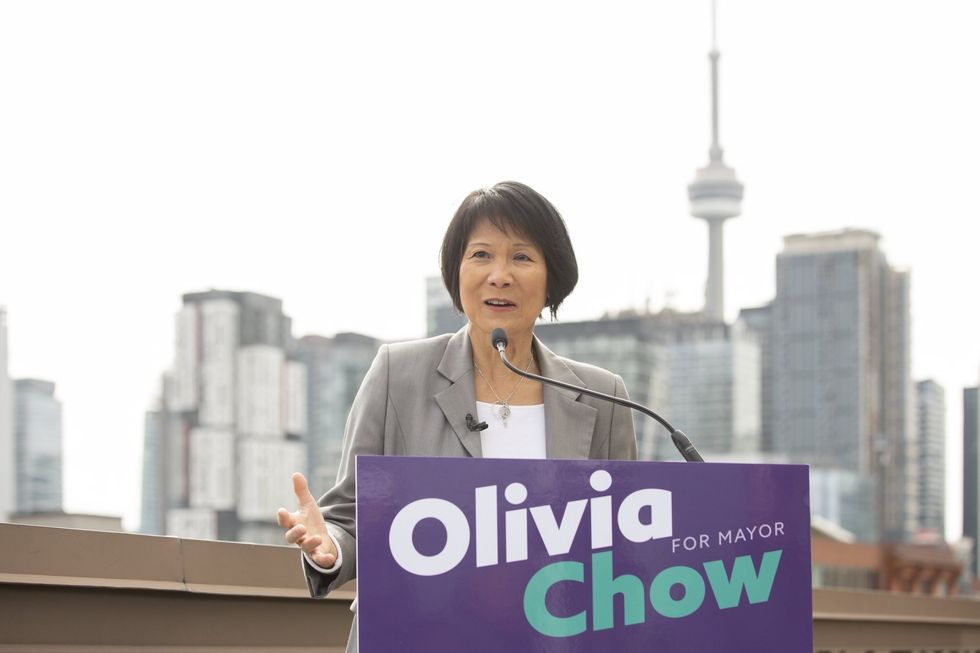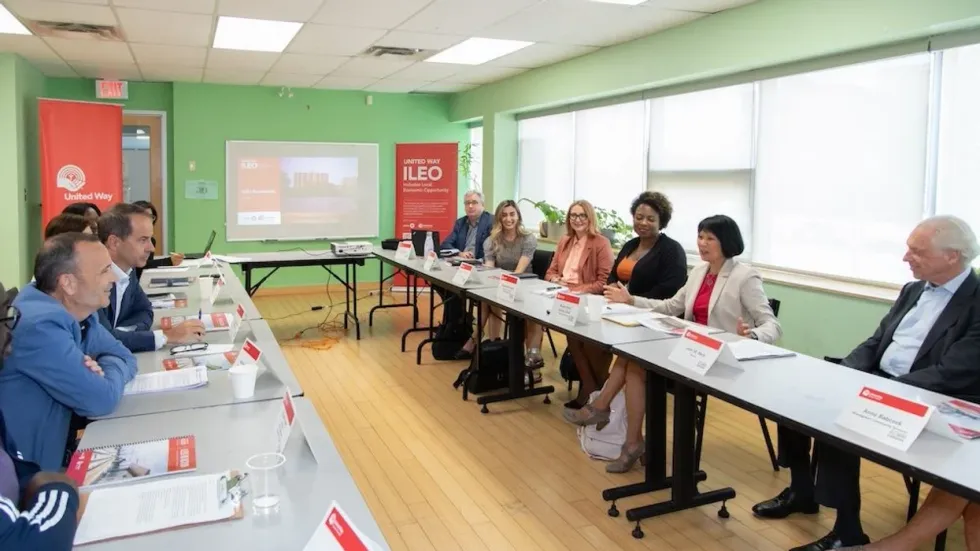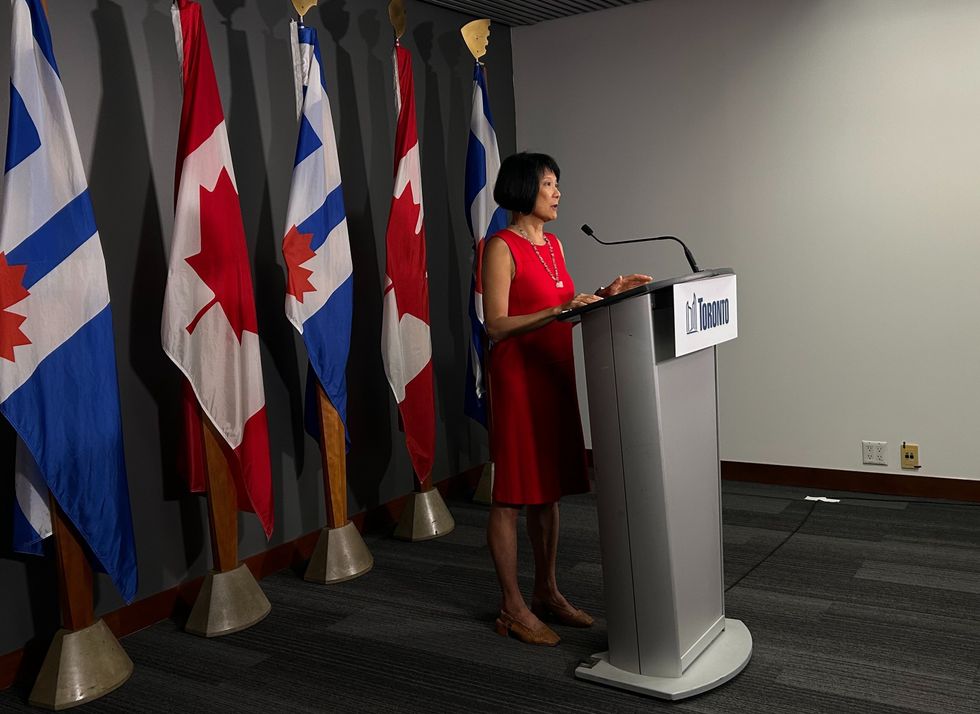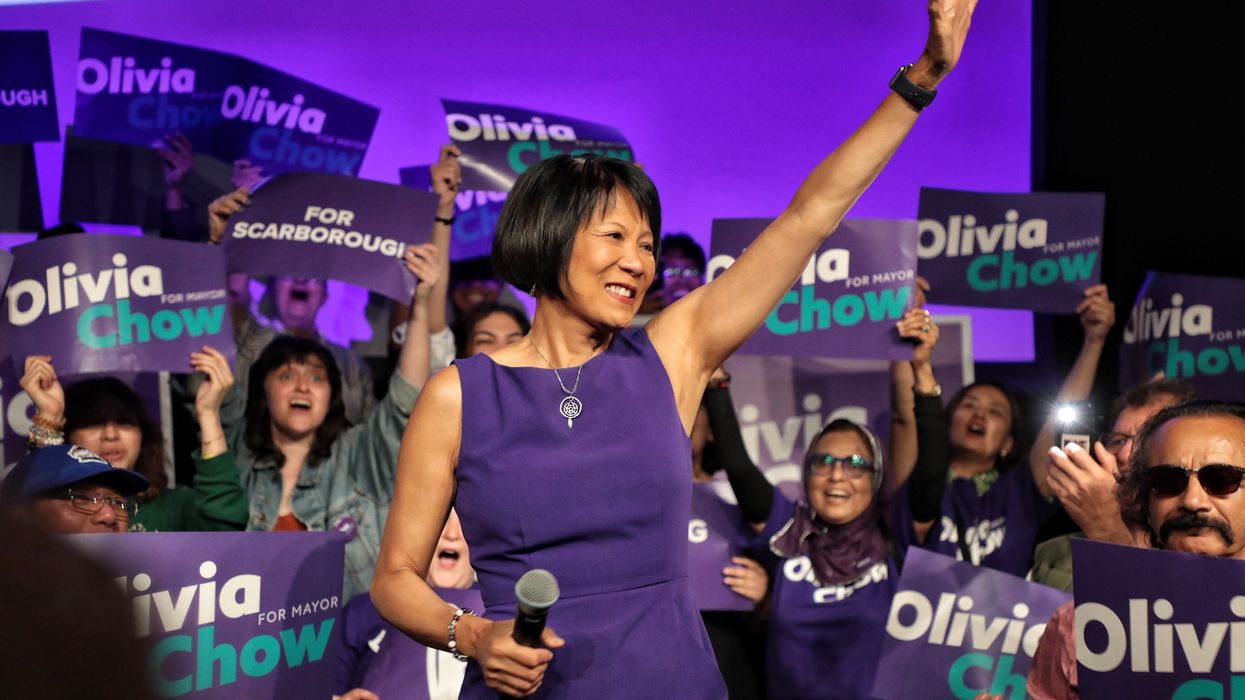The ‘Newsmaker of the Year’ is part of STOREYS annual week-long editorial series. You can find the rest of our 2023 Ontario selections here as they're released throughout the week.
This past spring, in the wake of John Tory’s, ahem, dramatic exit from politics, Olivia Chow kicked off her campaign to become Toronto’s next mayor. As we now know, Chow came out on top in June’s by-election, and in the six months since, has rallied hard for the causes her campaign centered around. Chow’s priorities surrounding affordable housing and public transit, as well as her early achievements as mayor, have earned her the title of STOREYS' 2023 Real Estate Newsmaker of The Year.
Although June’s race was unexpectedly tight, Chow’s rise to mayor was somewhat expected. She announced her intention to run in April and, within weeks, the polls had her in a firm lead.
Of course, endorsements from runner-up in the 2022 mayoral election Gil Penalosa, current NDP MPP Kristyn Wong-Tam, and city council members like Ausma Malik (Spadina Fort York) and Jamaal Myers (Scarborough North) strengthened Chow’s campaign, but what seemed to really set her apart from her competitors was how tuned in she was to the chronic problems facing everyday Torontonians.
“People in Toronto are feeling stuck,” Chow told STOREYS shortly after launching her campaign. “They’re stuck waiting for the bus, stuck in traffic, or stuck on lists for housing, childcare, and recreation programs. After a decade of conservative mayors, the city has become more expensive and less liveable for people.”

Chow’s platform was decidedly renter-centric, and perhaps most notably, she vowed to build 25,000 rent-controlled homes over the next eight years on City-owned land — including at least 7,500 affordable units and at least 2,500 rent-geared-to-income units — a move that would see the City act as a developer.
“The City of Toronto has not built affordable housing for two decades and that has to change,” Chow has said to STOREYS. “The survival of a great city depends on how well we take care of each other, and you can't do any of it without people having a roof over their heads.”
To that same end, Chow’s campaign promises extended to establishing a Renters Action Committee and a Secure Affordable Homes Fund, increasing the reach of Toronto’s rent bank and existing eviction prevention program, and strengthening the supports available to the city’s homeless population.

Chow stepped into mayorship at an unprecedented and inarguably challenging time for Toronto. With the housing crisis at large, cost of living through the roof, and transit development at a near-standstill, her work has truly been cut out for her. But headway has been made.
Over the past six months, Chow has approved a new Municipal Land Transfer Tax for luxury homes, and, as promised, has created a framework to raise the Vacant Home Tax from 1% to 3%.
As with any tax bump, there have been naysayers — Ontario Premier Doug Ford being one of them. But to any skeptics, Chow has emphasized that the funds collected from the taxes will help to support the city’s existing affordable housing initiatives and to help house the city’s most vulnerable, which she argues is good for the city at large.
In the meantime, Chow has managed to secure $100M from the federal government and $26.4M from the provincial government over the past few months to be used for interim housing for asylum seekers. Chow continues to push the feds to open up emergency shelters in the city for asylum seekers as winter fast approaches.

We’d be remiss not to mention the near-unanimous approval of an ambitious new affordable housing plan that could see 65,000 new rent-controlled homes fast-tracked over the next seven years.
Approval of the plan means that the City can now move forward with a public development model — something that Chow floated while on the campaign trail — meant to bolster public and non-profit ownership of affordable housing. Five City-owned sites have been identified for immediate development, with 11 Brock Avenue being the first of the bunch.
“This is a very, very modest beginning to build up our muscle memory,” Chow told STOREYS in October. “You’ve got to start somewhere, right? We want to start small.”
The public development model has been met with skepticism from development sector stakeholders, it’s worth noting — in large part because very few details of how the model will work from a development standpoint have been made public. It also remains to be seen how this model will differ from other lacklustre development initiates from the City such as HousingNow.
Chow ended November with a historic “new deal” with the provincial government, securing up to $1.2B in provincial operating supports over three years and significant capital relief for Toronto.
Those funds will be used to identify provincially owned lands in Toronto that can be used to build homes, step up homelessness supports (conditional on federal support for refugee and asylum claimants), and support new subway-integrated provincial transit projects, the Eglinton Crosstown LRT and the Finch West LRT. As well, the funding could go towards 55 new subway trains for the TTCs (also conditional on support from the feds).
The funding will be contingent on Toronto either meeting or exceeding its provincially imposed housing target of building more than 73,000 new homes by 2025. Beyond that, Chow has agreed to a fairly contentious trade-off; as part of the new deal, Toronto has accepted the Province’s authority to advance approvals for Ontario Place.
Mayor Chow has made more than headlines this year, she’s made progress. And for a city as stuck in its ways as Toronto has been for decades, the concrete steps she’s taken in her first six months in office are deserving of some recognition. But it’s only been six months, and Chow and her team have barely scratched the surface of Toronto’s problems. The road ahead is a long one, and only time will tell if Toronto housing – quite literally – goes up from here.






















